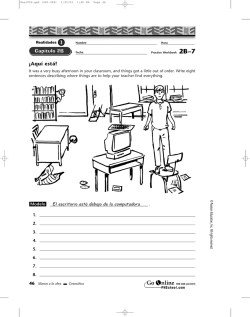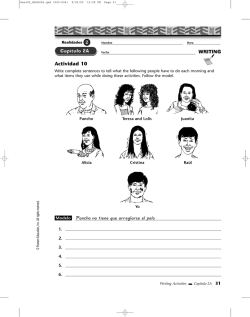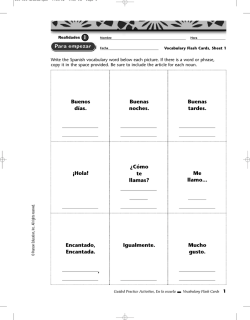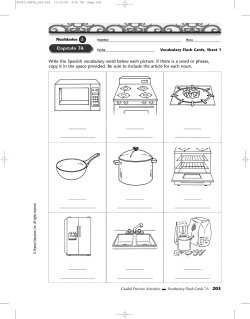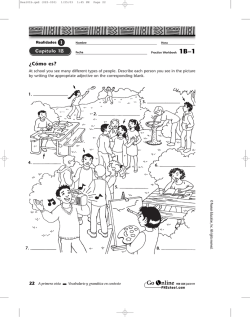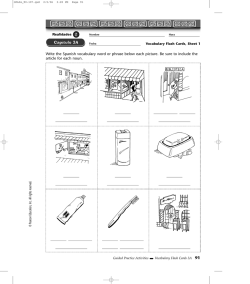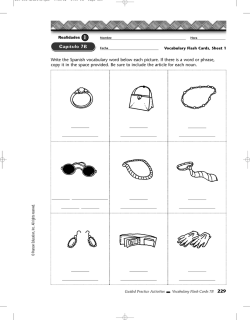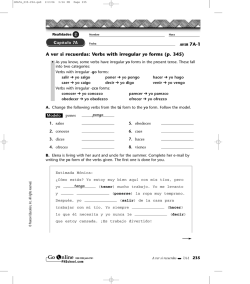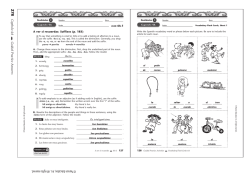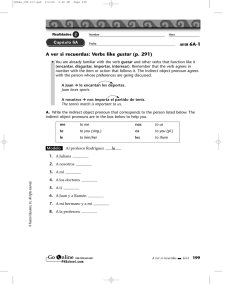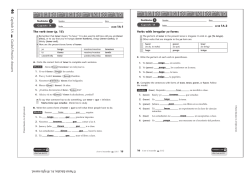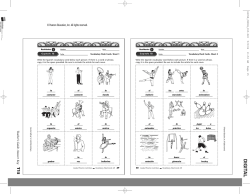
Adjectives (p. 3) M o
Realidades Nombre Fecha Hora Guided Practice Activities PE-1 Adjectives (p. 3) • Remember that adjectives describe nouns: people, places, and things. The following is a list of some common adjectives in Spanish. Masculine Feminine Singular Plural Singular Plural serio serios seria serias deportista deportistas deportista deportistas trabajador trabajadores trabajadora trabajadoras paciente pacientes paciente pacientes joven jóvenes joven jóvenes A. Read each sentence. Circle the adjective and underline the noun. Follow the model. Modelo Enrique es un joven serio. 1. Mi primo es joven. 2. Mis hermanas son chicas jóvenes. 3. Carlos y Pedro son chicos deportistas. 4. Tú eres una persona paciente. 5. Yo soy una chica trabajadora. © Pearson Education, Inc. All rights reserved. 6. Nosotras somos estudiantes serias. • In Spanish, if a person, place, or thing is masculine, the adjective that describes it must be masculine: El chico es muy serio. • If it’s feminine, then the adjective must be feminine: María es muy alta. B. Find the noun in each sentence below. Determine whether each noun is masculine or feminine and write M for masculine and F for feminine in the first blank. Then, fill in the missing letter in each adjective: -o for masculine nouns and -a for feminine nouns. Follow the model. Modelo M Ricardo es muy seri o . 1. F Mi amiga Karla es alt a . 2. F Mi tía es una mujer ordenad a . 3. M Mi abuelo es un hombre desordenad o . 4. M Ese chico es muy gracios o . i\Xc`[X[\j%Zfd • Web Code: jdd-0001 Guided Practice Activities PE-1 5 Realidades Nombre Hora Fecha Guided Practice Activities PE-2 Adjectives (continued) • In Spanish, if the person, place, or thing is singular, the adjective that describes it must be singular. Mi hermano es paciente. My brother is patient. • If the person, place, or thing is plural, then the adjective is also plural. Mis abuelos son pacientes. My grandparents are patient. C. Circle the adjective that best completes the sentence. Use the underlined word to help you. Follow the model. a. graciosa. b. graciosas. 1. Mis hermanas son a. joven. b. jóvenes. 2. Pedro es a. guapo. b. guapos. 3. Los niños son a. serios. b. serio. 4. Marta es a. trabajadoras. b. trabajadora. 5. Eduardo es a. altos. b. alto. 6. Nosotras somos a. desordenadas. b. desordenada. Modelo Mi abuela es D. Look at each sentence below and write the correct ending in the space provided. Follow the model. Modelo as María y Anita son chicas muy simpátic_____. a 1. Tú no eres una chica ordenad_____. © Pearson Education, Inc. All rights reserved. os 2. Mis primos son chicos gracios_____. as 3. Nosotros somos personas estudios_____. os 4. Tú y Pancho son estudiantes reservad_____. o 5. Mi padre es un hombre baj_____. os 6. Mis hermanos no son niños atrevid_____. e 7. Nacho es un chico sociabl_____. 6 Guided Practice Activities PE-2 i\Xc`[X[\j%Zfd • Web Code: jdd-0001 Realidades Nombre Hora Fecha Guided Practice Activities PE-3 The verb ser (p. 5) • Ser is an irregular verb and it means “to be.” These are its present-tense forms: yo soy I am nosotros(as) somos We are tú eres You are (fam.) vosotros(as) sois You are (fam., pl.) Ud./él/ella es He, she is; You are (form.) Uds./ellos/ellas son They are; You are (form.) • Remember that you can use ser with adjectives to tell what someone is like: Esas chicas son altas. Those girls are tall. A. Choose the correct form of the verb ser in the word bank to complete the sentences. Follow the model. eres Modelo eres Tú soy 1. Yo somos somos es son es reservado. eres 4. Tú sociable. 2. Nosotros 3. Elena soy 5. Ustedes deportistas. inteligente. son trabajadores. alta. © Pearson Education, Inc. All rights reserved. • To tell where someone is from, use ser + de + place: Ricardo es de México. Ricardo is from Mexico. B. Say where each of the people is from below based on their nationality. Follow the model. Modelo Linda: venezolana Linda es de Venezuela. 1. Juan Carlos y Sofía: españoles Ellos son de España. 2. Rosa: guatemalteca Rosa es de Guatemala. Tú eres de México. Orlando es de Cuba. 5. Luz y Marisol: colombianas Ellas son de Colombia. 6. Mercedes y yo: panameñas Nosotras somos de Panamá. 3. tú: mexicano 4. Orlando: cubano i\Xc`[X[\j%Zfd • Web Code: jdd-0002 Guided Practice Activities PE-3 7 Realidades Nombre Hora Fecha Guided Practice Activities PE-4 Present tense of regular verbs (p. 9) • Hablar (to talk), comer (to eat), and vivir (to live) are regular verbs. To form the present tense, drop the -ar, -er, or -ir endings and add the present-tense endings. hablar comer vivir yo hablo como vivo tú hablas comes vives usted/él/ella habla come vive nosotros/nosotras hablamos comemos vivimos vosotros/vosotras habláis coméis vivís ustedes/ellos/ellas hablan comen viven A. Circle the present-tense verb form in each sentence. Modelo Nosotros corremos en el parque. 1. Mis amigas viven en Nueva York. 3. Yo escribo mi tarea en el cuaderno. 2. Carlos come en casa a las seis. 4. Ustedes hablan inglés y español. © Pearson Education, Inc. All rights reserved. B. Look at the drawings below. Complete each description by circling the correct form of the verb using the subject pronouns given. Modelo Él ( escuchan / escucha ) la radio. 1. Andrea ( escribimos / escribe ) cuentos. 2. Tú ( usa / usas ) la computadora. i\Xc`[X[\j%Zfd • Web Code: jdd-0004 Guided Practice Activities PE-4 11 Realidades Nombre Hora Fecha Guided Practice Activities PE-4a Present tense of regular verbs (continued) 3. Nosotras ( comes / comemos ). 4. Marta ( toca / tocamos ) la guitarra. 5. Ustedes ( cantan / canto ) muy bien. C. Choose the correct ending for each incomplete verb and draw a line beneath your choice. Follow the model. Modelo Ana camin( -a / -e ) a la escuela. 1. Tomás escrib( -a / -e ) cuentos fantásticos. 2. Nosotros practic( -amos / -emos ) muchos deportes. 3. Yo escuch( -a / -o ) la música clásica. 4. Juan y Lola le( -en / -an ) novelas de horror. Modelo nada Luis corre 1. Lolis 2. ¿Tú montas 3. Vicente y yo 4. Tú y Rodrigo 5. Yo (nadar) en la piscina. (correr) en el parque todos los días. (montar) en monopatín? comemos viven (vivéis) saco 12 Guided Practice Activities (comer) en el restaurante mexicano. (vivir) en el mismo pueblo. (sacar) la basura. PE-4a i\Xc`[X[\j%Zfd • Web Code: jdd-0004 © Pearson Education, Inc. All rights reserved. D. Write the correct form of each verb in the space provided. Realidades Nombre Hora Vocabulary Flash Cards, Sheet 1 Fecha Copy the word or phrase in the space provided. Be sure to include the article for each noun. ¿Quién(es)? ¿Cómo? ¿De dónde? ¿De ¿Quién(es)? ¿Cómo? viejo, vieja © Pearson Education, Inc. All rights reserved. viejo atrevido, atrevida , vieja reservada atrevido desordenado, desordenada , atrevida reservado, reservada reservado dónde? gracioso graciosa Guided Practice Activities , desordenada gracioso, graciosa , desordenado sociable , sociable Vocabulary Flash Cards Para empezar 1 Realidades Nombre Fecha Hora Vocabulary Flash Cards, Sheet 2 These blank cards can be used to write and practice other Spanish vocabulary for the chapter. © Pearson Education, Inc. All rights reserved. 2 Guided Practice Activities Vocabulary Flash Cards Para empezar Realidades Nombre Hora Vocabulary Check, Sheet 1 Fecha © Pearson Education, Inc. All rights reserved. Tear out this page. Write the English words on the lines. Fold the paper along the dotted line to see the correct answers so you can check your work. ¿Cómo eres tú? What are you like? alto, alta tall atrevido, atrevida daring bajo, baja short desordenado, desordenada messy estudioso, estudiosa studious gracioso, graciosa funny guapo, guapa good-looking impaciente impatient inteligente intelligent ordenado, ordenada neat reservado, reservada reserved, shy sociable sociable trabajador, trabajadora hard-working Fold In Guided Practice Activities Vocabulary Check Para empezar 3 Realidades Nombre Fecha Hora Vocabulary Check, Sheet 2 Tear out this page. Write the Spanish words on the lines. Fold the paper along the dotted line to see the correct answers so you can check your work. ¿Cómo eres tú? tall alto, alta daring atrevido, atrevida short bajo, baja messy desordenado, desordenada studious estudioso, estudiosa funny gracioso, graciosa good-looking guapo, guapa impatient impaciente intelligent inteligente neat ordenado, ordenada reserved, shy reservado, reservada sociable sociable hard-working trabajador, trabajadora © Pearson Education, Inc. All rights reserved. What are you like? Fold In 4 Guided Practice Activities Vocabulary Check Para empezar
© Copyright 2026
